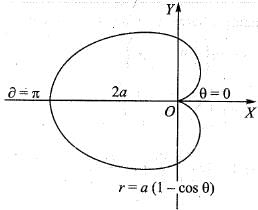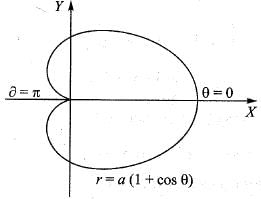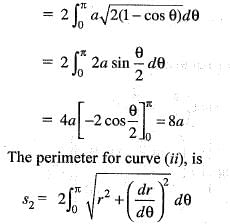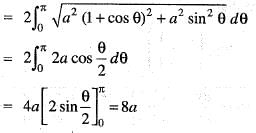Mathematics Exam > Mathematics Questions > The perimeters of the cardioids r = a (1 - co...
Start Learning for Free
The perimeters of the cardioids r = a (1 - cos θ) and r = a (1 + cos θ) differ by:
- a)2a
- b)4
- c)8a
- d)0
Correct answer is option 'D'. Can you explain this answer?
| FREE This question is part of | Download PDF Attempt this Test |
Verified Answer
The perimeters of the cardioids r = a (1 - cos θ) and r = a (1+ ...
The curves are
r = a(1 - cos θ) ...(i)
r = a(1 + cos θ) ...(ii)
The perimeter for curve (i) is





Hence s1 - s2 = 8a - 8a = 0.
r = a(1 - cos θ) ...(i)
r = a(1 + cos θ) ...(ii)
The perimeter for curve (i) is





Hence s1 - s2 = 8a - 8a = 0.
Most Upvoted Answer
The perimeters of the cardioids r = a (1 - cos θ) and r = a (1+ ...
The perimeter of a cardioid can be found by integrating the length of its curve. The equation for the cardioid is r = a(1 - cosθ), where r is the distance from the origin to a point on the curve, θ is the angle between the polar axis and the line connecting the origin to the point, and a is a constant.
To find the length of the curve, we need to find the derivative of r with respect to θ, which gives us dr/dθ = a sinθ. Then, we can use the arc length formula to find the length of the curve:
L = ∫√(r^2 + (dr/dθ)^2) dθ
= ∫√(a^2(1 - cosθ)^2 + a^2 sin^2θ) dθ
= ∫√(a^2(1 - 2cosθ + cos^2θ + sin^2θ)) dθ
= ∫√(a^2(2 - 2cosθ)) dθ
= ∫a√(2 - 2cosθ) dθ.
This integral can be evaluated using trigonometric identities. Let's use the identity cos(θ/2) = ±√((1 + cosθ)/2) to simplify the integral:
L = ∫a√(2 - 2cosθ) dθ
= a∫√(2 - 2cosθ) dθ
= a∫√(4sin^2(θ/2)) dθ
= 2a∫|sin(θ/2)| dθ
= 4a∫sin(θ/2) dθ
= -4a cos(θ/2) + C.
To find the total perimeter of the cardioid, we need to evaluate this expression for the range of θ values that cover the entire curve. The range of θ for a cardioid is typically from 0 to 2π, so:
L = -4a cos(2π/2) + 4a cos(0/2)
= -4a cos(π) + 4a cos(0)
= -4a(-1) + 4a(1)
= 8a.
Therefore, the perimeter of the cardioid r = a(1 - cosθ) is 8a.
To find the length of the curve, we need to find the derivative of r with respect to θ, which gives us dr/dθ = a sinθ. Then, we can use the arc length formula to find the length of the curve:
L = ∫√(r^2 + (dr/dθ)^2) dθ
= ∫√(a^2(1 - cosθ)^2 + a^2 sin^2θ) dθ
= ∫√(a^2(1 - 2cosθ + cos^2θ + sin^2θ)) dθ
= ∫√(a^2(2 - 2cosθ)) dθ
= ∫a√(2 - 2cosθ) dθ.
This integral can be evaluated using trigonometric identities. Let's use the identity cos(θ/2) = ±√((1 + cosθ)/2) to simplify the integral:
L = ∫a√(2 - 2cosθ) dθ
= a∫√(2 - 2cosθ) dθ
= a∫√(4sin^2(θ/2)) dθ
= 2a∫|sin(θ/2)| dθ
= 4a∫sin(θ/2) dθ
= -4a cos(θ/2) + C.
To find the total perimeter of the cardioid, we need to evaluate this expression for the range of θ values that cover the entire curve. The range of θ for a cardioid is typically from 0 to 2π, so:
L = -4a cos(2π/2) + 4a cos(0/2)
= -4a cos(π) + 4a cos(0)
= -4a(-1) + 4a(1)
= 8a.
Therefore, the perimeter of the cardioid r = a(1 - cosθ) is 8a.

|
Explore Courses for Mathematics exam
|

|
Similar Mathematics Doubts
The perimeters of the cardioids r = a (1 - cos θ) and r = a (1+ cos θ) differ by:a)2ab)4c)8ad)0Correct answer is option 'D'. Can you explain this answer?
Question Description
The perimeters of the cardioids r = a (1 - cos θ) and r = a (1+ cos θ) differ by:a)2ab)4c)8ad)0Correct answer is option 'D'. Can you explain this answer? for Mathematics 2024 is part of Mathematics preparation. The Question and answers have been prepared according to the Mathematics exam syllabus. Information about The perimeters of the cardioids r = a (1 - cos θ) and r = a (1+ cos θ) differ by:a)2ab)4c)8ad)0Correct answer is option 'D'. Can you explain this answer? covers all topics & solutions for Mathematics 2024 Exam. Find important definitions, questions, meanings, examples, exercises and tests below for The perimeters of the cardioids r = a (1 - cos θ) and r = a (1+ cos θ) differ by:a)2ab)4c)8ad)0Correct answer is option 'D'. Can you explain this answer?.
The perimeters of the cardioids r = a (1 - cos θ) and r = a (1+ cos θ) differ by:a)2ab)4c)8ad)0Correct answer is option 'D'. Can you explain this answer? for Mathematics 2024 is part of Mathematics preparation. The Question and answers have been prepared according to the Mathematics exam syllabus. Information about The perimeters of the cardioids r = a (1 - cos θ) and r = a (1+ cos θ) differ by:a)2ab)4c)8ad)0Correct answer is option 'D'. Can you explain this answer? covers all topics & solutions for Mathematics 2024 Exam. Find important definitions, questions, meanings, examples, exercises and tests below for The perimeters of the cardioids r = a (1 - cos θ) and r = a (1+ cos θ) differ by:a)2ab)4c)8ad)0Correct answer is option 'D'. Can you explain this answer?.
Solutions for The perimeters of the cardioids r = a (1 - cos θ) and r = a (1+ cos θ) differ by:a)2ab)4c)8ad)0Correct answer is option 'D'. Can you explain this answer? in English & in Hindi are available as part of our courses for Mathematics.
Download more important topics, notes, lectures and mock test series for Mathematics Exam by signing up for free.
Here you can find the meaning of The perimeters of the cardioids r = a (1 - cos θ) and r = a (1+ cos θ) differ by:a)2ab)4c)8ad)0Correct answer is option 'D'. Can you explain this answer? defined & explained in the simplest way possible. Besides giving the explanation of
The perimeters of the cardioids r = a (1 - cos θ) and r = a (1+ cos θ) differ by:a)2ab)4c)8ad)0Correct answer is option 'D'. Can you explain this answer?, a detailed solution for The perimeters of the cardioids r = a (1 - cos θ) and r = a (1+ cos θ) differ by:a)2ab)4c)8ad)0Correct answer is option 'D'. Can you explain this answer? has been provided alongside types of The perimeters of the cardioids r = a (1 - cos θ) and r = a (1+ cos θ) differ by:a)2ab)4c)8ad)0Correct answer is option 'D'. Can you explain this answer? theory, EduRev gives you an
ample number of questions to practice The perimeters of the cardioids r = a (1 - cos θ) and r = a (1+ cos θ) differ by:a)2ab)4c)8ad)0Correct answer is option 'D'. Can you explain this answer? tests, examples and also practice Mathematics tests.

|
Explore Courses for Mathematics exam
|

|
Suggested Free Tests
Signup for Free!
Signup to see your scores go up within 7 days! Learn & Practice with 1000+ FREE Notes, Videos & Tests.


















